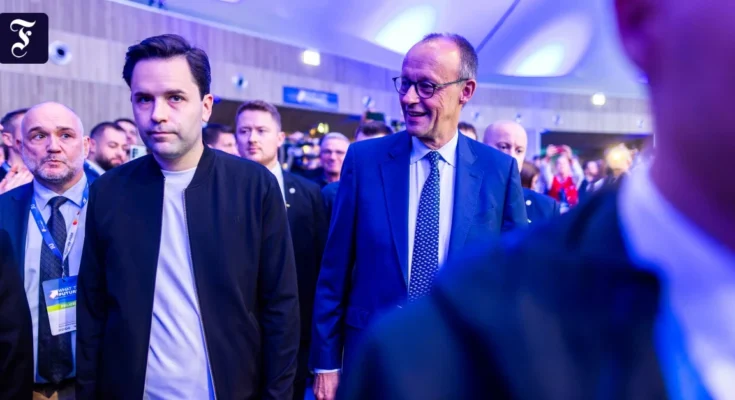In the coalition’s dispute over the planned pension package, the front has increasingly hardened. After the SPD rejected any changes to the government’s draft law, young Union politicians continued to express their objections to the draft law. “The Junge Union (JU) has made it clear that it supports the youth group’s position in the Bundestag,” the head of the CDU/CSU youth organization, Johannes Winkel, told FAZ on Monday.
Winkel reiterated his willingness to support the core agreements in the coalition agreement. This aims to eliminate the so-called sustainability factor in the pension formula in 2031 so that pension funds can increase further. “This is detrimental to us, but we are sticking to the coalition agreement,” he said.
However, JU remains resistant to using the same law to increase pension spending permanently. “How many additional costs will arise after 2031 must be answered in an open and comprehensive discussion at the Pension Commission,” reminded Winkel. “If there is to be real pension reform, we cannot decide on the important issues of the day – without reverse funding.” “We must now discuss this in coalition in the German Bundestag.”
Merz rejects minority government
According to the government’s plan, pension funding will increase by two percentage points more in 2031 than under current law. JU’s demands are aimed at not guaranteeing this additional increase permanently, as this would trigger additional spending of 100 billion euros between 2032 and 2040.
However, Finance Minister Lars Klingbeil (SPD) reiterated his party’s stance. Everything has been discussed “and from my side it can now be decided,” he said in Beijing, where he is currently taking part in the German-Chinese financial dialogue. However, Federal Youth Minister Karin Prien (CDU) advocated postponing the vote in the Bundestag.
Meanwhile, Chancellor Friedrich Merz denied speculation about the possibility of forming a minority government if the coalition collapsed. “In my opinion, such a thing is impossible,” he said at the “Süddeutsche Zeitung” economic summit. “Does anyone really believe that we can work with a changed majority in the German Bundestag and still do a reasonable legislative job?”
The left keeps the deal open
What is the pension dispute about? Younger MPs accepted that the sustainability factor in the pension formula would be suspended until 2031, according to the agreement. This is actually intended to reduce pension adjustments if the ratio of contributions to retirees worsens so as not to burden workers and employers. MPs are calling for 2032 to be based on our current conditions without intervention in the pension formula. Pension cuts are not included in pension legislation.
But in some years, the increase will be smaller to cover the deferred increase. The SPD firmly rejects such an approach. He just wants to start with a pension rate increase and leave it there. This young group has 18 members.
Without these MPs, the Chancellor and the coalition would not have a majority in the Bundestag. Even if an opposition party came up with the idea of electing black and red, there would be more than a shadow over the alliance. If the DPR proves unable to take action on its own to address key issues, then further voting will be futile.
The Green Party criticized Spahn
It is the task of the two parliamentary group leaders, Jens Spahn (CDU) and Matthias Miersch (SPD), to organize the majority. Free of mandate or not, in reality there is definitely pressure on members of parliament. If the youth group “collapses” it will result in a loss of face for its members. Therefore more is needed. We can assume that consensus is already being sought behind the scenes. In government, this is usually carried out by Chancellor of the Exchequer Thorsten Frei, Minister of State for Finance Björn Böhning (SPD) and Minister of the Interior Alexander Dobrindt (CSU).
The Chancellor’s reference to the work of the Pensions Reform Commission may not be enough. Why should the SPD then agree to what it now vehemently rejects? What Merz showed on Sunday evening in the ARD program “Report from Berlin” is seen as more promising in the Union’s parliamentary group: a binding agreement in the law itself or in a parallel-passed application on how rising social security costs should be compensated.
If this is concrete and reliable, then this could be a bridge for young members of the Unity Faction. Early retirement and active retirement do not count. The development of a private pension program for children and state-supported tax breaks for employees entering retirement age have long been in the cards. These changes provide no relief to contributors.
Is there a way out if the Union and SPD cannot achieve a majority on their own? The Chancellor cannot rely on the Green Party to step in and ensure a majority. “The pension law is completely inadequate, we, the Greens, will not agree to it,” deputy president of the parliamentary group Andreas Audretsch told FAZ – and he added: “Friedrich Merz has completely stayed away from the dispute over pensions. In his words, Jens Spahn became “the worst parliamentary group leader of all time.” Audretsch supports permanently stabilizing the pension rate at 48 percent to prevent poverty in old age. “At the same time, major reforms are needed. The impact cannot just be placed on the younger generation.”
Left-wing parliamentary group leader Sören Pellmann told FAZ that his group would not agree to further damage to the system. He asked Spahn to ensure that the bill to stabilize pension levels is passed. Since it was reduced to 48 percent, the risk of poverty in old age has almost doubled. “So this is the absolute minimum.” It would be fair to have employment insurance paid for by everyone – including civil servants, self-employed people and politicians. Then stable contributions and a pension rate of 53 percent can be financed.


